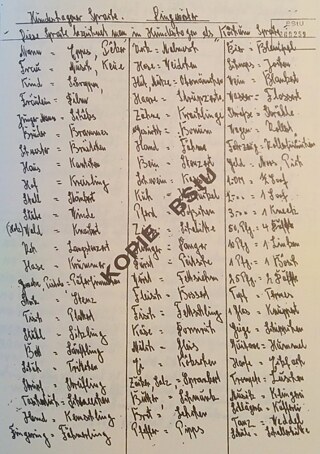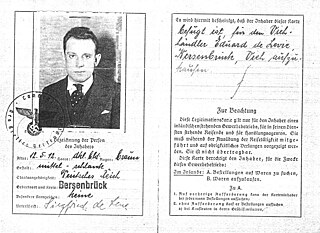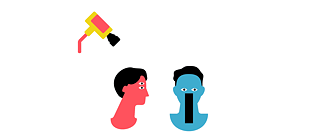In his last article, Klaus Siewert describes how oppressed and persecuted people in dictatorial systems were able to convey bitter truths with the help of their knowledge of Rotwelsch. He concludes with a short summary – and an appeal.
For many centuries, from the 12th to the 20th century, the use of secret languages had two effects: On the one hand, it created a social and linguistic demarcation from the outside world; on the other, it constituted a group and created solidarity within it. In the 19th century, criminological discourse and efforts to expose the social underworld led to the marginalisation and discrimination of the social groups concerned. This was exacerbated at the beginning of the 20th century, when a certain linguistic purism was criticised, with clear anti-Semitic tendencies. There was talk of the “linguistic depopulation of Germany” caused by “crooked red German interspersed with lousy Hebrew” (Eduard Engel, 1916).Coded communication under dictatorship
In the recent past, under repressive conditions in dictatorships and undemocratic states, historical secret languages such as Rotwelsch dialects have experienced a kind of revival. Oppressed and persecuted minorities developed new secret languages, such as the camp and ghetto languages during the Nazi era. But the perpetrators also used instruments of secret language communication, such as the ENIGMA (a cipher machine for encrypting messages) and the camouflage language used by German fighter pilots for on-board radio communication.
Camouflage language of the German fighter pilots in World War 2 | Siewert, Pauke, Pauke! 2019, 19
Rotwelsch against state surveillance
Even after the Second World War and during the period of German division, state surveillance and censorship led to the refunctionalisation of Rotwelsch dialects as secret languages: “My dear wife! I have just received your mail with great pleasure … Many greetings to Schofel [bad] and Bock [hungry],“ read a few lines from a letter written by a Russian prisoner of war in 1946. The central message, “We are doing badly here and are starving”, is integrated into the letter’s innocuous farewell formula by means of supposed nicknames and thus smuggled past the censors.The rulers of the GDR observed and criticised the Red World dialects used on their territory as forms of communication that endangered the state. The inhabitants of Hundeshagen in the Eichsfeld region, former travelling musicians, communicated secretly on sensitive subjects so as not to be misunderstood if they were intercepted by the Stasi. The Stasi, however, tried to decipher the language: it compiled a glossary of Hundeshagener Kochum, the Rotwelsch dialect that originated in Hundeshagen. This was based on intercepted secret telephone conversations. A secret message from the GDR (a postcard from a mother to her daughter living in West Germany) complains about the situation in East Germany: “Uns schlehnt es ganz mole hier.” (We are doing very badly here.)

STASI glossary Hundeshagener Kochum | excerpt; Documentation Centre of the IGS
The fate of Jewish cattle traders
Schmus lakonisch, kafferin schefft bekan! “Speak Lakonisch, the farmer is within earshot!”Lakonisch – that was the secret language of the cattle traders, also known simply as Hebrew because of the high proportion of Hebrew-derived camouflage words. The trade was not always serious. In addition to its use as a secret language, it also contained the usual wisdom and linguistic fun of the time: Keine beist im Stall, kein zumes in der tasch, schieweken pattisch – dallas gewiss!
(No cow in the stable, no money in the purse, a pregnant woman in the house – then your downfall is certain!)
With the rise of National Socialism, not only did this joke come to an end: the defamation, persecution and murder of Jews that accompanied the Nazi dictatorship naturally also affected the cattle trade, and Jewish cattle dealers in particular. They were insulted as “cattle Jews”, accused of fraud and tax evasion and often lost their trading licences. The “Decree for the Restoration of Honesty in the Cattle Trade” also led to a ban on the use of the language of the cattle trader in some areas of Germany.

“Legitimisation card” of the cattle trader Siegfried de Levie | ill. Siewert, Hebrew, 2018, 128
Secret languages remain
Our journey through the world of secret communication is now coming to an end. Since the need for linguistic demarcation has always been part of human communication and is therefore timeless, secret languages and codes will continue to emerge in the future, based on universal procedures of alienation or newly invented methods of communicative exclusion. Some already exist – in very different areas of life: Drug trafficking, the taxi business, supermarket checkouts.Do you know of any secret languages, past or present, that we may not be aware of? Then we would love to hear from you: info@igs-sondersprachenforschung.de
If you would like to deepen your knowledge of secret languages, we recommend the books on secret and special languages published by Buske-Verlag: buske.de/sondersprachen.html
Word! The Language Column
Our column “Word!” appears every two weeks. It is dedicated to language – as a cultural and social phenomenon. How does language develop, what attitude do authors have towards “their” language, how does language shape a society? – Changing columnists – people with a professional or other connection to language – follow their personal topics for six consecutive issues.
December 2024
